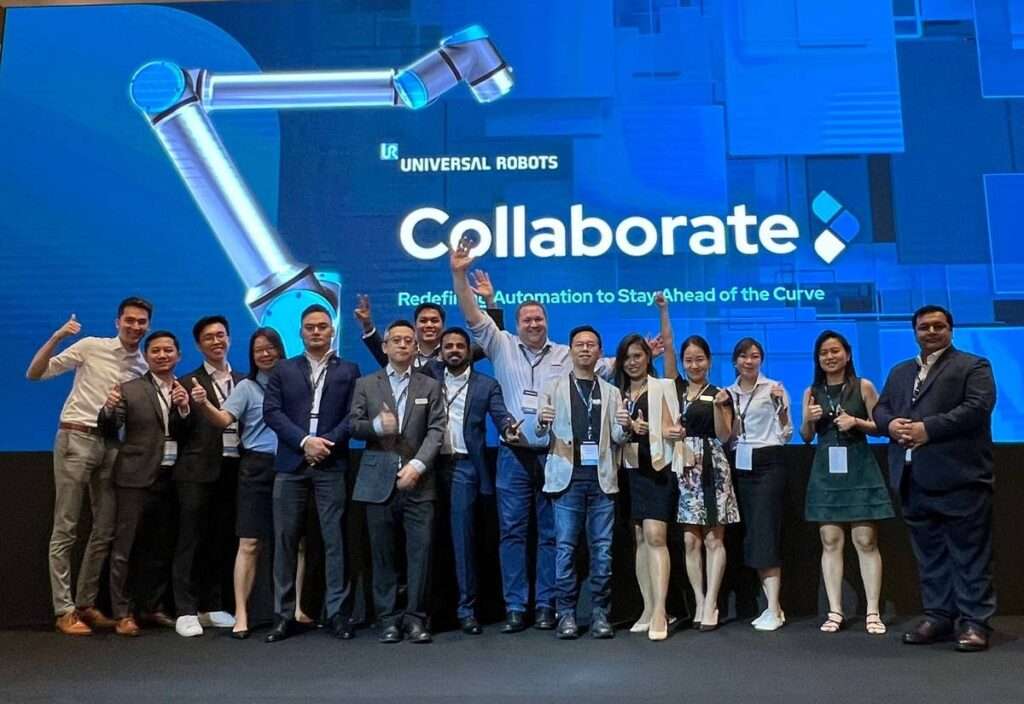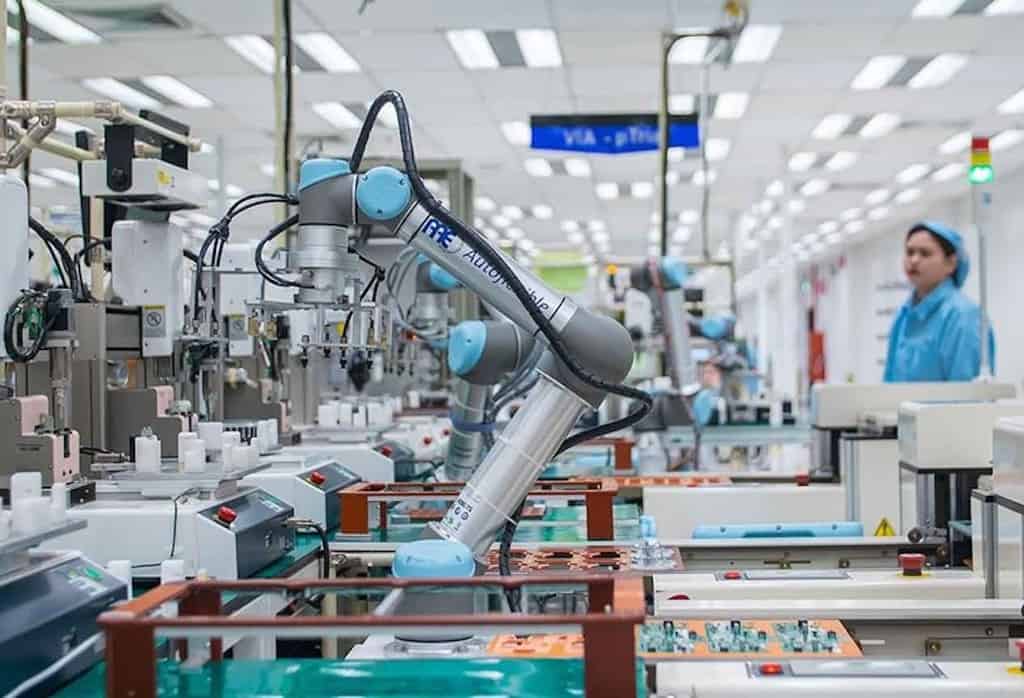What To Know
- Universal Robots (UR), one of the leading cobot vendors in the world, brought together some of the world’s leading minds and practitioners to converge at arguably the largest collaborative robot (cobot) conference in Asia Pacific, on November 23, 2022.
- SINGAPORE – Universal Robots (UR), the global leader in the rapidly growing market of collaborative robots (cobots), holds Collaborate APAC 2022, the largest cobot conference in Asia Pacific, today at The Athenee Hotel, a Luxury Collection Hotel in Bangkok, Thailand.
Editor’s brief: Universal Robots (UR), one of the leading cobot vendors in the world, brought together some of the world’s leading minds and practitioners to converge at arguably the largest collaborative robot (cobot) conference in Asia Pacific, on November 23, 2022. Read more below.
SINGAPORE – Universal Robots (UR), the global leader in the rapidly growing market of collaborative robots (cobots), holds Collaborate APAC 2022, the largest cobot conference in Asia Pacific, today at The Athenee Hotel, a Luxury Collection Hotel in Bangkok, Thailand.
Building a collaborative ecosystem
Creating value, earning trust, and making a personal connection are paramount in today’s fast-paced world. Successful businesses are embedded in a network of complementary enterprises that work together to achieve common goals. One such firm is Universal Robots, which has spawned a wide variety of subsidiary firms that are all connected through a common commitment to innovation. Primarily, UR+, a distributor network, certified system integrators, and original equipment manufacturers make up the UR ecosystem (OEM).
By developing a system to collaborate with third-party technology experts, Universal Robots has created the first ecosystem of certified UR+ partners in the world. Each company’s requirements are different, so these partners provide tailor-made sets of components and software. There are currently more than 300 UR+ partners and 400 certified UR+ components, application kits, and solutions available on the UR+ platform. Cobots, hardware, software, installation services, manual and operational support, and training are just some examples of the UR+ solutions that are becoming increasingly common to help manufacturers overcome their problems. Furthermore, all UR+ products have been tested and verified to be fully compatible with UR cobots, allowing for seamless integration.
Collaborate APAC 2022, hosted by Universal Robots, is the largest conference of its kind, bringing together participants from all over the cobot ecosystem to share their wares and show off their solutions for manufacturers. OnRobot, Mirka Asia Pacific Pte Ltd., SCHUNK Intec Pte Ltd., Baumer (Singapore) Pte Ltd., SICK Pte Ltd., Nordbo Robotics, Mech-Mind Robotics, and Impaqt Robotics were just some of the OEMs and UR+ partners who were invited to speak during the keynote sessions. The UR ecosystem allows manufacturers to creatively integrate robots and humans into the workforce to enhance both working conditions and productivity, as opportunity and necessity continue to drive innovation.
Conference Highlights
Speaking as the conference’s opening keynote speaker, Universal Robots’ Chief Commercial Officer Mathias Wiklund described the company’s ongoing efforts to maintain a balance between the stability of a global enterprise and the innovation of a start-up.
“From its humble beginnings in Denmark, this current day we have deployed 50,000 cobots around the world, represented by 1000 employees, across 6 continents, over 200 ecosystem partners with applications looking to improve and benefit various industries across the world. This is UR,” says Wiklund. “We are honoured to be joined by our UR ecosystem partners who will give insights on how we can disrupt the common processes of operative work by working with UR collaborative robots. Human centricity is the main idea behind collaborative robots, therefore as a result enhancing the quality of life of workers with automation and robots. This is the future of work; agile, efficient, and productive.”
At Collaborate APAC 2022, Universal Robots will show off the UR20 cobot, the company’s latest generation of industrial cobots. The conference is a chance to show off Universal Robots’ brand new collaborative, industrial cobot to an audience of over 200 people, including cobot users, decision-makers, influencers, and UR+ ecosystem partners.
The new UR20, with its 1,750 mm reach and 20 kg payload, is made to push performance to new heights while maintaining the adaptability, usability, and small footprints that have become hallmarks of UR cobots. Universal Robots, in keeping with this year’s “Redefining Automation” theme, showcases how the rethought, redesigned, and rebuilt UR20 provides improved efficiency and quality.
Niels Haenisch, Partner, Boston Consulting Group, Lead, Innovation Centre for Operation, Singapore, will give the opening keynote address at Collaborate APAC 2022, and he will be discussing the foundational elements of automation and its future development.
“In previous industrial revolutions (steam engine, electrification, and computerisation), the exact same question was being discussed. And in truth, technological change always brings huge changes to workers. In preindustrial economies, farmers made up more than 80 percent of the population. In today’s developed economies, it is less than 5 percent. However, that does not mean that 75 percent are now unemployed. While some tasks were taken on by technology, many new jobs are created as well. The same holds true for this current Digital Industrial Revolution. In I4.0, there will be fewer lower-qualified manual jobs and more jobs requiring well-qualified backgrounds like data scientists and completely new job profiles such as robotics coordinators. In many cases, technology will not replace workers but relieve them to work on better roles, leading to “a Bionic Enterprise” in which humans and technology collaborate and complement each other’s capabilities for higher impact and productivity,” says Haenisch.
Senior leaders kick off a panel discussion
Collaborate APAC 2022 is a forum where industry heavyweights get together to debate whether or not Asia could truly benefit from a four-day manufacturing week. Work fatigue as a result of the pandemic is manifested in a variety of ways, including increased stress and exhaustion from meeting customer deadlines. Work-life balance and other related concepts have gained popularity in recent years. Milieu found that seventy-five percent of Thai workers would be interested in switching to a four-day work week. The manufacturing sector is less receptive to such arrangements, despite the fact that many companies have taken steps to pioneer this idea and emphasized a four-day work week. At the panel, experts in automation and robotics discuss how new technologies can be used to cut down on hours spent at work while simultaneously boosting employee morale.
The session was facilitated by Dr Yeong Che Fai, Associate Professor, University of Technology Malaysia. Panellists include:
- Balaji Koneru, General Manager, Nala Robotics
- Dr Prapin Abhinorasaeth, President, Thai Automation and Robotics Association
- Lars Bach, Head of R&D, Cobot Arm, Universal Robots
“The feasibility of four-day manufacturing work week in Thailand would be a real challenge to achieve. To achieve this, the successful deployment of automation and robotic systems in the manufacturing floor, business process automation and AI such as smart Enterprise Resource Planning (ERP) in back office and IIoT and IoT data connectivity between the two are among the requirements needed. Besides, the existing and additional Thai government corporate tax incentives will help make it a reality,” says Dr Prapin Abhinorasaeth, President, Thai Automation and Robotics Association.

###




